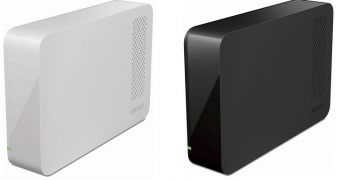Data security is one of the biggest issues with removable media devices, and a big part of why some countries forbid the use of flash drives, and external SSDs/HDDs, by government organizations. Buffalo has just released an HDD with password protection though.
Data encryption and password protection technologies came as a response to the concerns that they are security risks.
Technically, these safety measures existed before countries began to ban removable media, but they weren't widespread.
Now, though, it seems that every other external and/or portable flash drive, solid-state drive and hard disk drive had something to keep data secure.
Whether 128-bit or 256-bit encryption (hardware- or software-based), password protection or even physical keypads for pin numbers, measures have been taken.
Thus, the Buffalo HD-LLU3 external hard drive is a mild version of secure external storage unit, thanks to the "Easy Lock" function.
Easy Lock password-locks the data on the drive automatically, even if you suddenly disconnect the drive from the PC without going through the safety OS steps.
This is more relevant than some people may think, because the unplugging of a USB data port also cuts the energy that the HDD runs on.
And yet the Buffalo HD-LLU3 can reestablish the password protection and add it to all new files even if the connection is terminated abruptly.
That said, the new external drive measures 39 x 187 x 120 mm / 1.53 x 7.36 x 4.72 inches and weighs one kilo / 2.20 pounds.
Sales should begin near the end of the ongoing month (April 2014), in capacities of 1 TB, 2 TB, 3 TB and 4 TB, with a starting price of 13,600¥ / $130 / €95. There will be both black and white cases for you to choose from if you decide to get one.
It is uncertain how fast availability will spread from Japan to other countries, however. It might take weeks, or even a month or two, assuming that the company even has designs for international shipping. At this point, it is not altogether clear.
Technically, you should be able to carry the drives with you in a bag just as easily as you would a tablet. The reason they aren't called “portable” is because they are too large and heavy to be slipped in a pocket. If it's one of those small things you're looking for, you'll have to browse a bit and keep an eye out for the “2.5-inch” form factor, or the “portable” and “mobile” labels.

 14 DAY TRIAL //
14 DAY TRIAL //